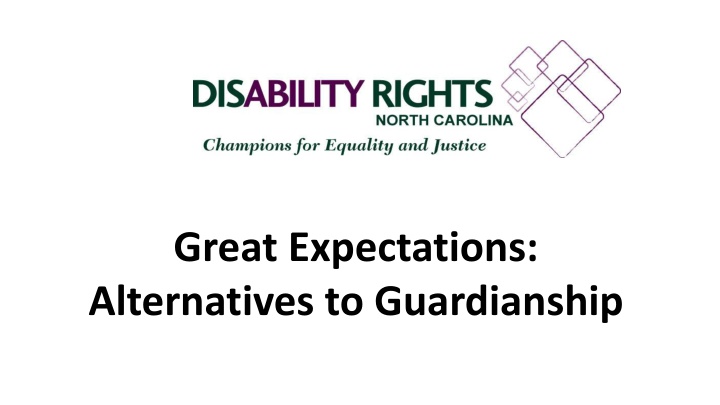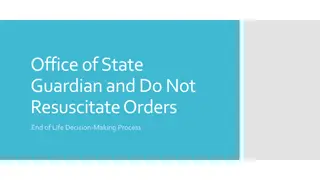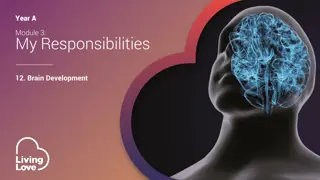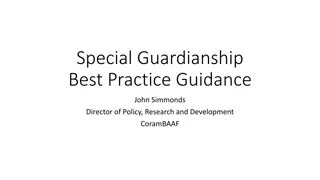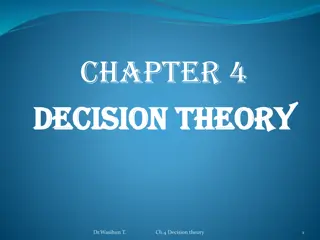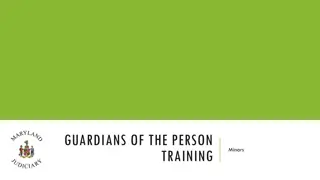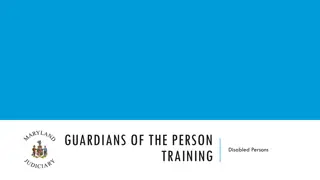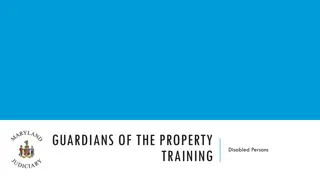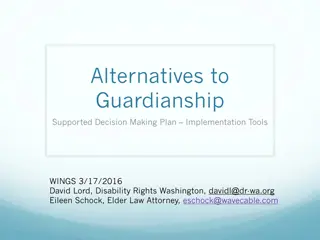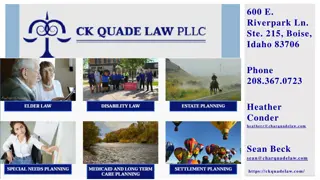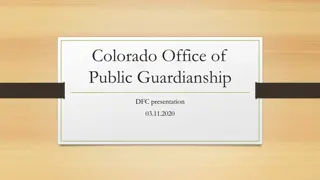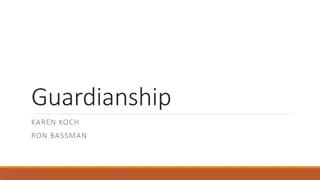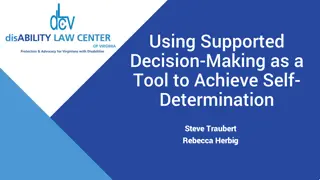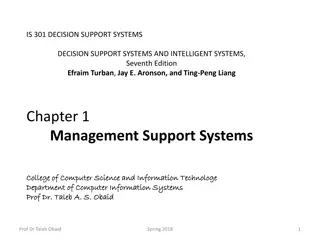Alternatives to Guardianship in Decision-Making
Alternative options like voluntary decision-making agreements and representative payees within the realm of guardianship for individuals with disabilities. Discover ways to navigate decision-making processes effectively.
Download Presentation

Please find below an Image/Link to download the presentation.
The content on the website is provided AS IS for your information and personal use only. It may not be sold, licensed, or shared on other websites without obtaining consent from the author.If you encounter any issues during the download, it is possible that the publisher has removed the file from their server.
You are allowed to download the files provided on this website for personal or commercial use, subject to the condition that they are used lawfully. All files are the property of their respective owners.
The content on the website is provided AS IS for your information and personal use only. It may not be sold, licensed, or shared on other websites without obtaining consent from the author.
E N D
Presentation Transcript
Great Expectations: Alternatives to Guardianship
What is Disability Rights NC? Protection and Advocacy (P&A) system for people with disabilities in NC. We: Investigate complaints of serious abuse or neglect Advocate for legal rights Tell people with disabilities about their rights and support self-advocacy All of our services are FREE for people with disabilities!
Decision-Making Authority Guardianship: A court order defines scope of authority of guardian. Power of attorney, representative payee, living will, supported decision- making agreement, etc.: A written contract/ agreement between individuals. In other words, a person s authority to make or participate in making decisions about someone else must be in writing!
Guardianship If a person has been adjudicated incompetent, Clerk must appoint a guardian (general guardian, guardian of the estate, guardian of the person) Incapacity is not an all-or-nothing matter. Limited guardianship is appropriate when an individual has sufficient capacity to make certain types of decisions. A helpful tool to identify areas of decision-making strength is the Guardianship Capacity Questionnaire available on NC Courts website, and Disability Rights NC website
Becoming Ones Own Guardian Again Competency is a changing status. People can recover and/or acquire skills that lessen or eliminate the need for guardianship. The ward, guardian, or other interested person can motion for restoration of competency. Motion for restoration of competency must be filed with the Clerk of Court that has jurisdiction over the guardianship. *May not be current county of residence.*
Alternatives to Guardianship: Voluntary Decision-Making Agreements
Representative Payee Social Security Agency (SSA) selects a person or organization to receive and manage benefits on behalf of a beneficiary who is legally incompetent or whom SSA determines is not capable of managing benefits. Main responsibilities of the rep payee are to (i) use the benefits to pay for current and foreseeable needs of the beneficiary; (ii) save any benefits not needed to meet current needs; (iii) keep records of expenses; and (iv) provide SSA with an accounting. Must be approved by SSA to be rep payee. ( Power of Atty)
Special Bank Account A variety of arrangements can be made. Personal banker can discuss options.
Special Needs Trust A trust designed to hold funds for the benefit of a person with a disability. Typically useful when a person with a disability receives a large, lump sum of money that will impact his or her eligibility for Medicaid or other lifeline benefits.
ABLE Account Similar purpose as a special needs trust, structured like a 529 college savings account. Is designed to hold funds for the benefit of a person with a disability. Money deposited in the account will not impact his or her eligibility for benefits. $100,000 maximum (above this counts towards benefits eligibility), and $14,000 maximum contributions/year. Disability must be diagnosed before age 26.
Home Health Care Home health agencies can assist with activities of daily living such as bathing, dressing, cooking, and cleaning and can support someone in the community if the person can make decisions about their care.
Supportive Housing Permanent housing with services (type of service depends on needs of residents). The housing is usually affordable - intended to serve persons on an SSI income. Supportive Services: services such as case management, medical or psychological counseling and supervision, child care, transportation and job training provided for the purpose of facilitating the independence of residents. (definitions from NC Housing Coalition glossary of terms)
Health Care Power of Attorney* Allows the person designated as POA to make health care decisions in the event of incapacity. The appointment of a guardian terminates a health care power of attorney for the ward. You may nominate someone in POA document to be your guardian in the event you are later adjudicated incompetent, and the clerk shall appoint them.
Advance Instruction for MH Treatment* Also known as a Psychiatric Advanced Directive Allows a person to give instructions and preferences regarding mental health treatment, and to appoint an agent to make these decisions if they become incompetent.
Living Will* Declaration that person desires to die a natural death. A living will gives medical professionals permission to withhold or withdraw life support systems under certain conditions.
Power of Attorney* Person grants authority to the attorney-in-fact to handle some or all affairs. The POA may grant authority regarding one transaction or the authority to handle most of the person s personal and financial matters. The POA can: Be effective immediately, or Springing (i.e., at a point in the future, if a person becomes unable to handle their affairs, either temporarily or permanently), or Durable, meaning it survives incapacity, and remains in effect even if a guardian is appointed.
Supported Decision-Making Supported decision-making reflects the belief that we are all able to make decisions, and that some decisions are complex but can be made with support. The person with a disability chooses who will help them make decisions. The supporter may give advice, but does not make the final decision
3724 National Drive, Suite 100 Raleigh, NC 27612 Toll-Free: (877) 235-4210 Phone: (919) 856-2195 Website: www.disabilityrightsnc.org Email: info@disabilityrightsnc.org
